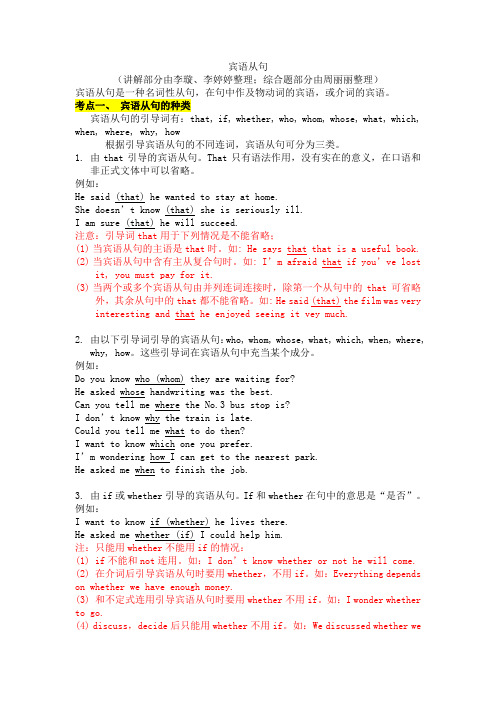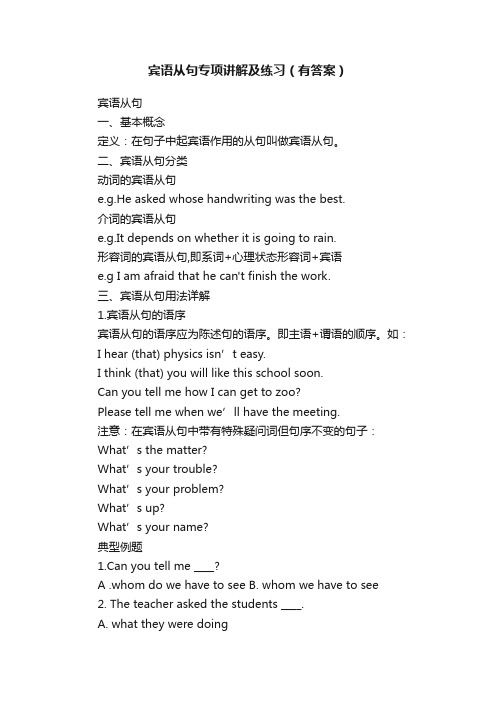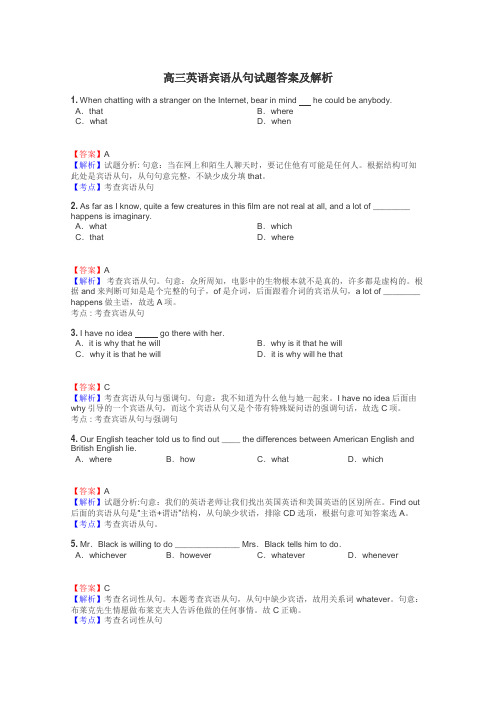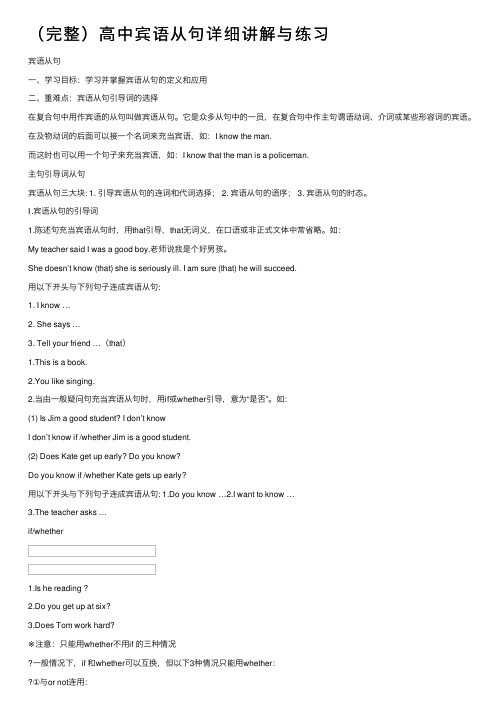最新高中宾语从句教案及历年真题详解
2023年12月高中英语教资面试真题教案逐字稿 高中英语语法课-宾语从句

2023年12月高中英语教资面试真题教案逐字稿高中英语语法课-宾语从句1. 题目:语法教学试讲2. 内容However, learning English as a foreign language is very difficult in the absence of a native language environment. Some respected theories on language acquisition believe that to attain a high level of fluency and accuracy in a foreign language, you need to be surrounded by it. But sadly the chances that we will all have the opportunity to live in an English-speaking country are small. Therefore, most of us have to rely on what we can learn at school as part of the school curriculum.3. 基本要求:(1) 朗读所给段落。
(2) 配合教学内容适当板书。
(3) 针对所给材料划线部分,设计宾语从句语法教学活动。
(4) 用英文试讲。
(5) 试讲时间: 10分钟。
教案Object ClausesTeaching Objectives1. Students will be able to understand the structure of object clauses.2. Students will master the usage of the guiding words in object clauses.3. Students will be able to use object clauses accurately in real-life situations.Teaching Content1. Definition and structure of object clauses.2. Guiding words and their usage in object clauses.3. Application of object clauses in real-life scenarios.Teaching Procedure1. Introduction:Introduce students to the structure and usage of object clauses through example sentences.2. Explanation:Definition: Explain what object clauses are and their role in sentences. Structure: Analyze the structure of example sentences in detail, including the guiding word, main clause, and subordinate clause.Guiding words: List common guiding words such as "that," "what," "which," etc., and explain their usage.3. Practice:Multiple choice: Provide multiple examples of object clauses and ask students to choose the correct guiding word or judge if the structure is correct.Fill-in-the-blank: Provide incomplete sentences and ask students to fill in the correct guiding word to make the sentence complete.4. Group discussion:Divide students into groups, provide each group with an example of an object clause, and ask them to discuss within the group whether the structure and usage of the guiding word are correct.5. Summary and feedback:Have students share their discussion results, provide feedback and correction suggestions, and emphasize the importance and usage of object clauses again.6. Homework:Assign relevant practice exercises for students to continue to consolidate the content learned in class.Teaching ReflectionReflect on the teaching after class, consider students' performance in the practice, judge their mastery of object clauses, and think about how to improve teaching methods to ensure students better grasp this grammar point."真题例句讲解Today we'll talk about object clauses, which are an important part of sentence structure. Object clauses function as the object of a sentence and provide more specific information about the subject or action. They can be complex or simple and are typically introduced by a preposition or a verb that requires an object.Let's take two examples to understand this better:Example 1:"Some respected theories on language acquisition believe that to attain a high level of fluency and accuracy in a foreign language, you need to be surrounded by it."In this sentence, the subject is "Some respected theories on language acquisition" and the predicate is "believe". The object clause is "that to attain a high level of fluency and accuracy in a foreign language, you need to be surrounded by it". This clause functions as the object of the verb "believe" and provides specific information about what the theories believe.Example 2:"Therefore, most of us have to rely on what we can learn at school as part of the school curriculum."In this sentence, the subject is "most of us", the predicate is "have to rely on", and the object clause is "what we can learn at school as part of the school curriculum". The word "what" acts as the guiding word followed by the content of the noun clause. This clause functions as the object of the verb "rely on" and specifies what most of us have to rely on.Object clauses can be identified by their subject-verb-object structure and their position in the sentence. They typically follow the verb that requires an object and provide additional information about the subject or action in the sentence.Now it's time for you to practice. Try to find more examples of object clauses in sentences you encounter in your daily life or in your readings. Understanding how object clauses work will help you build more complex sentences and express yourself more effectively. Remember, practice makes perfect! Keep at it, and you'll improve your language skills soon enough.。
英语高考宾语从句考点解析

宾语从句(讲解部分由李璇、李婷婷整理;综合题部分由周丽丽整理)宾语从句是一种名词性从句,在句中作及物动词的宾语,或介词的宾语。
考点一、宾语从句的种类宾语从句的引导词有:that, if, whether, who, whom, whose, what, which, when, where, why, how根据引导宾语从句的不同连词,宾语从句可分为三类。
1.由that引导的宾语从句。
That只有语法作用,没有实在的意义,在口语和非正式文体中可以省略。
例如:He said (that) he wanted to stay at home.She doesn’t know (that) she is seriously ill.I am sure (that) he will succeed.注意:引导词that用于下列情况是不能省略;(1)当宾语从句的主语是that时。
如: He says that that is a useful book.(2)当宾语从句中含有主从复合句时。
如: I’m afraid that if you’ve lostit, you must pay for it.(3)当两个或多个宾语从句由并列连词连接时,除第一个从句中的that可省略外,其余从句中的that都不能省略。
如: He said (that) the film was very interesting and that he enjoyed seeing it vey much.2.由以下引导词引导的宾语从句:who, whom, whose, what, which, when, where,why, how。
这些引导词在宾语从句中充当某个成分。
例如:Do you know who (whom) they are waiting for?He asked whose handwriting was the best.Can you tell me where the No.3 bus stop is?I don’t know why the train is late.Could you tell me what to do then?I want to know which one you prefer.I’m wondering how I can get to the nearest park.He asked me when to finish the job.3.由if或whether引导的宾语从句。
(完整版)高中宾语从句练习题及答案详解

高中宾语从句练习题及答案详解1.The place _______interested me most was the Children's Palace.A. WhichB. whereC. whatD. in which2.Do you know the man _______?A. whom I spokeB. to who spokeC. I spoke toD. that I spoke3.This is the hotel _______last month.A. which they stayedB. at that they stayedC. where they stayed atD. where they stayed4.Do you know the year ______the Chinese Communist Party was founded?A. whichB. thatC. whenD. on which5.That is the day ______I'll never forget.A. whichB. on whichC. in whichD. when6.The factory ______we'll visit next week is not far from here.A. whereB. to whichC. whichD. in which7.Great changes have taken place since then in the factory _______we are working.A. whereB. thatC. whichD. there8.This is one of the best films _______.A. that have been shown this yearB. that have shownC. that has been shown this yearD. that you talked9.Can you lend me the book ______the other day?A. about which you talkedB. which you talkedC. about that you talkedD. that you talked10.The pen ______he is writing is mine.A. with whichB. in whichC. on whichD. by which11.They arrived at a farmhouse, in front of ______sat a small boy.A. whomB. whoC. whichD. that12.The engineer ______my father works is about 50 years old.A. to whomB. on whomC. with whichD. with whom13.It there anyone in your class ______family is in the country?A. whoB. who'sC. whichD. whose14.I'm interested in ______you have said.A. all thatB. all whatC. thatD. which15.I want to use the same dictionary ______was used yesterday.A. whichB. whoC. whatD. as16.He isn't such a man ______he used to be.A. whoB. whomC. thatD. as17.He is good at English, ______we all know.A. thatB. asC. whomD. what18.Li Ming, ______to the concert enjoyed it very much.A. I went withB. with whom I wentC. with who I wentD.I went with him19.I don't like ______ as you read.A. the novelsB. the such novelsC. such novelsD. same novels20.He talked a lot about things and persons ________they remembered in the school.A. whichB. thatC. whomD. what21.The letter is from my sister, ______is working in Beijing.A. whichB. thatC. whomD. who22.In our factory there are 2,000 workers, two thirds of ____are women.A. themB. whichC. whomD. who23.You're the only person ______I've ever met ______could do it.A. who;/B./; whomC. whom;/D./; who24.I lost a book, ______I can't remember now.A. whose titleB. its titleC. the title of itD. the title of thatst summer we visited the West Lake, ______Hangzhou is famous in the world.A. for whichB. for thatC. in whichD. what26.I have bought such a watch _______ was advertised on TV.A. thatB. whichC. asD. it27.I can never forget the day _______ we worked together and the day ______ we spent together.A. when; whichB. which; whenC. what; thatD. on which; when28.The way ______he looks at problems is wrong.A. whichB. whoseC. whatD./29.This is the reason ______he didn't come to the meeting.A. in whichB. with whichC. thatD. for which30.This machine, ______for many years, is still working perfectly.A. after which I have lookedB. which I have looked afterC. that I have looked afterD. I have looked after31.The reason ______he didn't come was ______he was ill.A. why; thatB.that;whyC. for that;thatD.for which;what32.He is working hard, ______will make him pass the final exam.A.thatB.whichC.for whichD.who33.That is not the way ______I do it.A./B.whichC.for whichD.with which34.I have two grammars, ______are of great use.A. all of whichB. either of whichC. both of thatD. both of which35.I want to use the same tools _______used in your factory a few days ago.A. as wasB. which wasC. as wereD. which36.My neigh bours used to give me a hand in time of trouble, _______ was very kind of them.A. whoB. whichC. thatD. it37.This is the magazine _______ I copied the paragraph.A. thatB. whichC. from thatD. from which38.He is not such a man _______ would leave his work half done.A. thatB. whichC. whoD. as39. You can depend on whatever promise _______ he makes.A. /B. whyC. whenD. whose40. Smoking, _______ is a bad habit, is, however, popular.A. thatB. whichC. itD. though41. --- Did you ask the guard _______ happened?--- Yes, he told me all _______ he knew.A. what; thatB. what; whatC. which; whichD. that; that42. I shall never forget those years _______ I lived on the farm withthe farmers, _______ has a great effect on my life.A. when; whoB. that; whichC. which; thatD. when; which43. The number of the people who _______ cars _______ increasing.A. owns; areB. owns; isC. own; isD. own; are44. During the days ________, he worked as a servant at the Browns.A. followedB. followingC. to followD. that followed45. Is oxygen the only gas _______ helps fire burn?A. thatB. /C. whichD. it46. The clever boy made a hole in the wall, _______ he could see _____ was going on inside house.A. which; whatB. through which; whatC. through that; whatD. what; that47. Is _______ some German friends visited last week?A. this schoolB. this the schoolC. this school oneD. this school where48. John got beaten in the game, _______ had been expected.A. asB. thatC. whatD. who49. I have bought two ballpens, _______ writes well.A. none of themB. neither of themC. neither of whichD. none of which50. All that can be eaten _______ eaten up.A. are beingB. has beenC. had beenD. have been参考答案及解析1. A. which用作关系代词,在定语从句中作主语。
宾语从句专项讲解及练习(有答案)

宾语从句专项讲解及练习(有答案)宾语从句一、基本概念定义:在句子中起宾语作用的从句叫做宾语从句。
二、宾语从句分类动词的宾语从句e.g.He asked whose handwriting was the best.介词的宾语从句e.g.It depends on whether it is going to rain.形容词的宾语从句,即系词+心理状态形容词+宾语e.g I am afraid that he can't finish the work.三、宾语从句用法详解1.宾语从句的语序宾语从句的语序应为陈述句的语序。
即主语+谓语的顺序。
如:I hear (that) physics isn’t easy.I think (that) you will like this school soon.Can you tell me how I can get to zoo?Please tell me when we’ll hav e the meeting.注意:在宾语从句中带有特殊疑问词但句序不变的句子:What’s the matter?What’s your trouble?What’s your problem?What’s up?What’s your name?典型例题1.Can you tell me ____?A .whom do we have to see B. whom we have to see2. The teacher asked the students ____.A. what they were doingB. what were they doing3. She wants to know____.A. where does he liveB. Where he lives4. Her father asked _____.A. who the tallest isB. who is the tallest5.Do you know ____?A. what is on the desk B . what on the desk is答案:BABBA2.宾语从句的时态1). 若主句时态是一般现在时,宾语从句该用什么时态就用什么时态。
高一英语宾语从句试题答案及解析

高一英语宾语从句试题答案及解析1. When do you think________ back to our school?A.will Tom come B.Tom comingC.does Tom come D.Tom will come【答案】D【解析】句意:你认为汤姆什么时候能回到学校?do you think是插入语,放在疑问句中,疑问句的语序要变成陈述句,排除AC,B项coming不能做谓语,所以选D。
【考点】考查宾语从句的语序2. When changing lanes, a driver should use his turning signal to let other drivers know_______.A.he is entering which lane B.which lane he is enteringC.is he entering which lane D.which lane is he entering【答案】B【解析】考查宾语从句:句意:当改变车道的时候,司机应该使用转向信号让其他司机知道他要进入哪个车道。
定语从句的语序是陈述句语序,而且疑问词引导宾语从句,选B。
【考点】考查宾语从句3. ----What did he say?----He asked ______ for the book.A.how much did I payB.I paid how muchC.did I pay how muchD.how much I paid【答案】D【解析】考查宾语从句:句意:--他说什么了?--他问我为这本书付了多少钱?因为是宾语从句,所以语序是陈述句语序,排除AC,疑问词应该在前面,连接宾语从句,选D。
【考点】考查宾语从句4. ---I wonder _____e-mail English is better, yours or your parents’?---I prefer mine.A.that B.what C.whether D.whose【答案】D【解析】考查宾语从句。
高三英语宾语从句试题答案及解析

高三英语宾语从句试题答案及解析1. When chatting with a stranger on the Internet, bear in mind he could be anybody. A.that B.whereC.what D.when【答案】A【解析】试题分析: 句意:当在网上和陌生人聊天时,要记住他有可能是任何人。
根据结构可知此处是宾语从句,从句句意完整,不缺少成分填that。
【考点】考查宾语从句2. As far as I know, quite a few creatures in this film are not real at all, and a lot of ________ happens is imaginary.A.what B.whichC.that D.where【答案】A【解析】考查宾语从句。
句意:众所周知,电影中的生物根本就不是真的,许多都是虚构的。
根据and来判断可知是是个完整的句子,of是介词,后面跟着介词的宾语从句,a lot of ________ happens做主语,故选A项。
考点 : 考查宾语从句3. I have no idea go there with her.A.it is why that he will B.why is it that he willC.why it is that he will D.it is why will he that【答案】C【解析】考查宾语从句与强调句。
句意:我不知道为什么他与她一起来。
I have no idea后面由why引导的一个宾语从句,而这个宾语从句又是个带有特殊疑问语的强调句话,故选C项。
考点 : 考查宾语从句与强调句4. Our English teacher told us to find out ____ the differences between American English and British English lie.A.where B.how C.what D.which【答案】A【解析】试题分析:句意:我们的英语老师让我们找出英国英语和美国英语的区别所在。
人教版高一英语必修3宾语从句与表语从句详细讲解及练习

名词性从句在复合句中起名词作用的从句叫做名词性从句。
名词性从句的作用相当于名词,因此主语从句、表语从句、宾语从句和同位语从句分别作主句的主语、表语、宾语和同位语。
主语从句:Who will win the match is still unknown.宾语从句:I want to know what he has told you.表语从句:The fact is that we have lost the game.同位语从句:The news that we won the game is exciting.引导名词性从句的连接词可分为三类:连接词(不充当从句的任何成分):连接代词:what, who, whom, whose, which, wh+ever连接副词:when ,where ,how ,whyObject Clauses 宾语从句一、宾语从句的概念:宾语从句在复合句中作主句的宾语。
位置:通常放在主句谓语动词(及物动词)或介词之后。
句子结构:主句+连词(引导词)+ 宾语从句e.g. She asked if these answers were right.We can learn what we do not know.He will talk to us about what he saw in the U.S.A.I don’t know where we will hold the meeting.通过观察,我们可以知道宾语从句的语序用陈述语序:连接词+主语+谓语+其他成分1)Could you tell me______.A. you will get here whenB. when will you get hereC. get here when you willD. when you will get here2) Mother asked his son what ______for lunch at school.A. did he hadB. does he hadC. he hasD. he had3) Pointing to the young plant, he asked me ____ that was the one we had seen in the picture.A. whatB. ifC. whereD. how二、连接词1、从属连接词(不充当从句的任何成分):that ,whether ,if1)、I hear (that) he will be back in an hour.2)、I want to know if /whether he will go to the park with us用it做形式宾语的宾语从句时,it常可以放在动词think, find, consider, believe, feel, make等后作为形式宾语,而真正的宾语——that从句则放在句尾)(此时that一定不可以省略)I think it necessary that you should read English aloud.We heard it that she would get married next month.3、that从句位于句首时,that不可省略。
(完整)高中宾语从句详细讲解与练习

(完整)⾼中宾语从句详细讲解与练习宾语从句⼀、学习⽬标:学习并掌握宾语从句的定义和应⽤⼆、重难点:宾语从句引导词的选择在复合句中⽤作宾语的从句叫做宾语从句。
它是众多从句中的⼀员,在复合句中作主句谓语动词、介词或某些形容词的宾语。
在及物动词的后⾯可以接⼀个名词来充当宾语,如:I know the man.⽽这时也可以⽤⼀个句⼦来充当宾语,如:I know that the man is a policeman.主句引导词从句宾语从句三⼤块: 1. 引导宾语从句的连词和代词选择; 2. 宾语从句的语序; 3. 宾语从句的时态。
Ⅰ.宾语从句的引导词1.陈述句充当宾语从句时,⽤that引导,that⽆词义,在⼝语或⾮正式⽂体中常省略。
如:My teacher said I was a good boy.⽼师说我是个好男孩。
She doesn’t know (that) she is seriously ill. I am sure (that) he will succeed.⽤以下开头与下列句⼦连成宾语从句:1. I know …2. She says …3. Tell your friend …(that)1.This is a book.2.You like singing.2.当由⼀般疑问句充当宾语从句时,⽤if或whether引导,意为“是否”。
如:(1) Is Jim a good student? I don’t knowI don’t know if /whether Jim is a good student.(2) Does Kate get up early? Do you know?Do you know if /whether Kate gets up early?⽤以下开头与下列句⼦连成宾语从句: 1.Do you know …2.I want to know …3.The teacher asks …if/whether1.Is he reading ?2.Do you get up at six?3.Does Tom work hard?※注意:只能⽤whether不⽤if 的三种情况⼀般情况下,if 和whether可以互换,但以下3种情况只能⽤whether:①与or not连⽤:He asked me whether or not I was coming. Let me know whether you can come or not.②在介词之后:It depends on whether it is going to rain. I worry about whether I hurt her feelings ?③在不定式之前:We haven’t decided whether to go there. I don’t know whether to accept or refuse.3.如果宾语从句原来是特殊疑问句,只需⽤原来的疑问词引导。
- 1、下载文档前请自行甄别文档内容的完整性,平台不提供额外的编辑、内容补充、找答案等附加服务。
- 2、"仅部分预览"的文档,不可在线预览部分如存在完整性等问题,可反馈申请退款(可完整预览的文档不适用该条件!)。
- 3、如文档侵犯您的权益,请联系客服反馈,我们会尽快为您处理(人工客服工作时间:9:00-18:30)。
宾语从句The Object Clause1. I know him . (简单句)主语谓语宾语2. I know who he is . (复杂句)主语谓语连词从句主语从句谓语主句从句3.宾语从句的概念:宾语从句在复合句中作主句的宾语4.句子结构:主句+连词(引导词)+ 宾语从句一、连词(引导词)1. 当宾语从句是陈述句时(包括肯定句和否定句),连词由that引导,因为that 在从句中不作任何成分,也没有任何具体意思,因此在口语或非正式文体中常省略 Lin Tao feels (that) his own team is even better.She says (that) she won’t take part in the sports meeting next Sunday.在主句为动词be加某些形容词(如sorry, sure, afraid, glad等)作表语时,后面所跟的省略that的从句也可算是宾语从句I’m sorry (that) I don’t know .2. 当宾语从句是一般疑问句时,由连词whether或if引导(口语中常用if),因为if/whether翻译成:“是否”,具有一定的意义,所以不能省略Lily wanted to know if /whether her grandma liked the handbag.3. 当宾语从句是特殊疑问句时,由连接代词(what, who, whom, which, whose)或连接副词(when, where, how, why)引导,因为连接代词或连接副词在从句中担任一定的句子成分,具有一定的意义,所以不可以省略Do you know what he said just now ?I don’t remember when we arrived .带how的词组也都可以引导宾语从句Could you tell us how much it costs to fly to Hainan ?二、时态1. 如果主句是现在的时态(包括一般现在时,现在进行时,现在完成时),从句的时态可根据实际情况而定I know he lives here .I know he lived here ten years ago .2.如果主句是过去的时态(包括一般过去时,过去进行时),那么从句的时态一定要用相对应的过去的某种时态(包括一般过去时,过去进行时,过去将来时,过去完成时)I knew who lived here.I saw she was talking with her mother.3.当从句是客观真理,定义,公理,定理时用一般现在时。
The teacher said that the sun travels around the earth .三、语序宾语从句的语序用陈述语序:连接词+主语+谓语+其他成分注意事项1.could / would是委婉语气,而不是过去式,因此宾语从句的时态根据实际情况用不同时态。
Could you please tell me where we show our tickets ?2. 如果主句的谓语动词是ask时,连词不可能是that;如果主句的谓语动词是say 时,连词用thatShe says (that) she will leave a message on his desk.3. 如果从句中含有or或or not时,只能用whether而不用ifCould you tell me wh ether that’s a fast train or not ?4. 连词if 和when 在不同从句中的区别:Do you know if ______back next week ? If he ______ back , please let me know .A. he comes , will comeB. will he come , comesC. he will come , comesD. he will come , will come练习1. The young man asked _____ it's summer or winter.A. eitherB. thatC. weatherD. whether2. We don't know ______ they did it .A. howB. whoC. whatD. which3. The teacher asks us ____ Jim can come back on time .A. thatB. ifC. whenD. what time4. Does anybody know ______ we will have a sports meeting this weekend or not .A. ifB. whereC. whetherD. that5. I wonder _______ he is crying now .A. thatB. whyC. howD. when6. Have you found out ______ we can do on Hainan Island ?A. whatB. howC. ifD. whether7. Lily said _______ she had finished her composition .A. ifB. thatC. whenD. where8. I don’t know ______ he still lives here .A. whereB. whatC. whenD. whether9. Could you show me ________ ?A. how can I get to the stationB. where is the stationC. how I could get to the stationD. how I can reach the station10. Please tell me _______.A. what does he likeB. what he does likeC. what he likesD. what he like11. My sister told him ________ .A. what day was itB. when the train arrivedC. who she was waitingD. where did you live12. Could you tell me where we _______ next week .A. would goB. to goC. had to goD. will go13. Could you tell me how much ________to fly to Hainan ?A. do it costB. does it costC. it costD. it costs14. The small children don't know ______.A. what is their stockings inB. what is in their stockingsC. where is their stockings inD. what in their stockings.15.Someone is ringing the doorbell . Go and see _______ .A. who is heB. who he isC. who is itD. who it is16. Could you tell me how long __________ ?A. you have bought the watchB. you have kept this science bookC. have you been away from ChinaD. have you been a member of Greener China17 He says that if it _______ tomorrow , he _______宾语从句The Object Clause1. I know him . (简单句)主语谓语宾语2. I know who he is . (复杂句)主语谓语连词从句主语从句谓语主句从句3.宾语从句的概念:宾语从句在复合句中作主句的宾语4.句子结构:主句+连词(引导词)+ 宾语从句一、连词(引导词)1. 当宾语从句是陈述句时(包括肯定句和否定句),连词由that引导,因为that 在从句中不作任何成分,也没有任何具体意思,因此在口语或非正式文体中常省略 Lin Tao feels (that) his own team is even better.She says (that) she won’t take part in the sports meeting next Sunday.在主句为动词be加某些形容词(如sorry, sure, afraid, glad等)作表语时,后面所跟的省略that的从句也可算是宾语从句I’m sorry (that) I don’t know .2. 当宾语从句是一般疑问句时,由连词whether或if引导(口语中常用if),因为if/whether翻译成:“是否”,具有一定的意义,所以不能省略Lily wanted to know if /whether her grandma liked the handbag.3. 当宾语从句是特殊疑问句时,由连接代词(what, who, whom, which, whose)或连接副词(when, where, how, why)引导,因为连接代词或连接副词在从句中担任一定的句子成分,具有一定的意义,所以不可以省略Do you know what he said just now ?I don’t remember when we arrived .带how的词组也都可以引导宾语从句Could you tell us how much it costs to fly to Hainan ?二、时态1. 如果主句是现在的时态(包括一般现在时,现在进行时,现在完成时),从句的时态可根据实际情况而定I know he lives here .I know he lived here ten years ago .2.如果主句是过去的时态(包括一般过去时,过去进行时),那么从句的时态一定要用相对应的过去的某种时态(包括一般过去时,过去进行时,过去将来时,过去完成时)I knew who lived here.I saw she was talking with her mother.3.当从句是客观真理,定义,公理,定理时用一般现在时。
